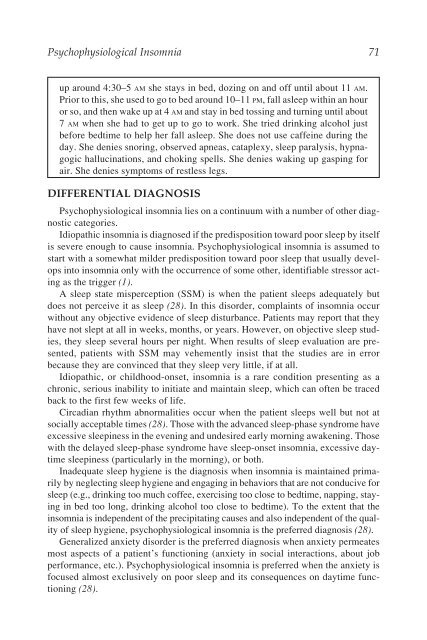Insomnia Insomnia
Insomnia Insomnia
Insomnia Insomnia
You also want an ePaper? Increase the reach of your titles
YUMPU automatically turns print PDFs into web optimized ePapers that Google loves.
Psychophysiological <strong>Insomnia</strong> 71<br />
up around 4:30–5 AM she stays in bed, dozing on and off until about 11 AM.<br />
Prior to this, she used to go to bed around 10–11 PM, fall asleep within an hour<br />
or so, and then wake up at 4 AM and stay in bed tossing and turning until about<br />
7 AM when she had to get up to go to work. She tried drinking alcohol just<br />
before bedtime to help her fall asleep. She does not use caffeine during the<br />
day. She denies snoring, observed apneas, cataplexy, sleep paralysis, hypnagogic<br />
hallucinations, and choking spells. She denies waking up gasping for<br />
air. She denies symptoms of restless legs.<br />
DIFFERENTIAL DIAGNOSIS<br />
Psychophysiological insomnia lies on a continuum with a number of other diagnostic<br />
categories.<br />
Idiopathic insomnia is diagnosed if the predisposition toward poor sleep by itself<br />
is severe enough to cause insomnia. Psychophysiological insomnia is assumed to<br />
start with a somewhat milder predisposition toward poor sleep that usually develops<br />
into insomnia only with the occurrence of some other, identifiable stressor acting<br />
as the trigger (1).<br />
A sleep state misperception (SSM) is when the patient sleeps adequately but<br />
does not perceive it as sleep (28). In this disorder, complaints of insomnia occur<br />
without any objective evidence of sleep disturbance. Patients may report that they<br />
have not slept at all in weeks, months, or years. However, on objective sleep studies,<br />
they sleep several hours per night. When results of sleep evaluation are presented,<br />
patients with SSM may vehemently insist that the studies are in error<br />
because they are convinced that they sleep very little, if at all.<br />
Idiopathic, or childhood-onset, insomnia is a rare condition presenting as a<br />
chronic, serious inability to initiate and maintain sleep, which can often be traced<br />
back to the first few weeks of life.<br />
Circadian rhythm abnormalities occur when the patient sleeps well but not at<br />
socially acceptable times (28). Those with the advanced sleep-phase syndrome have<br />
excessive sleepiness in the evening and undesired early morning awakening. Those<br />
with the delayed sleep-phase syndrome have sleep-onset insomnia, excessive daytime<br />
sleepiness (particularly in the morning), or both.<br />
Inadequate sleep hygiene is the diagnosis when insomnia is maintained primarily<br />
by neglecting sleep hygiene and engaging in behaviors that are not conducive for<br />
sleep (e.g., drinking too much coffee, exercising too close to bedtime, napping, staying<br />
in bed too long, drinking alcohol too close to bedtime). To the extent that the<br />
insomnia is independent of the precipitating causes and also independent of the quality<br />
of sleep hygiene, psychophysiological insomnia is the preferred diagnosis (28).<br />
Generalized anxiety disorder is the preferred diagnosis when anxiety permeates<br />
most aspects of a patient’s functioning (anxiety in social interactions, about job<br />
performance, etc.). Psychophysiological insomnia is preferred when the anxiety is<br />
focused almost exclusively on poor sleep and its consequences on daytime functioning<br />
(28).


